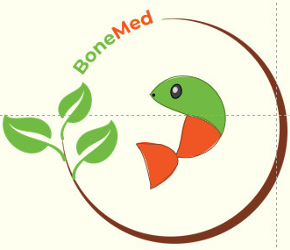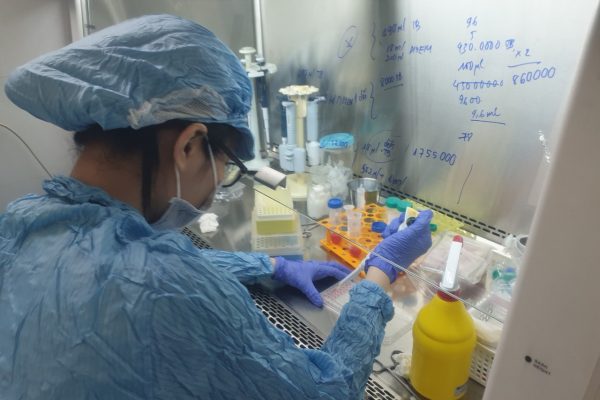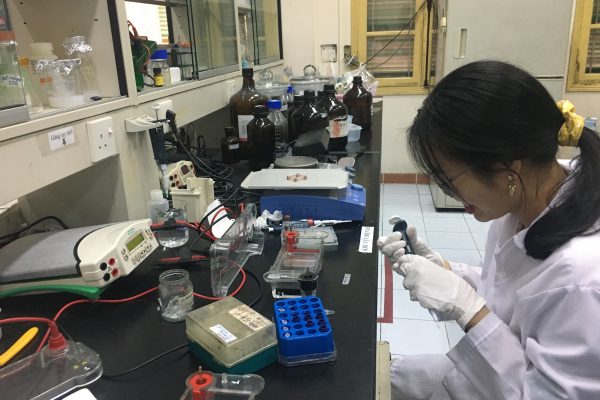Research in our department spans a wide range of biological scales from genes to proteins then cellular and later animal models with several main directions in the field of Animal Physiology, Human Biology and Biomedical Sciences.
1. BoneMed group with research on bone and osteoporosis using medaka fish models
Medaka fish (Oryzias latipes) and zebrafish (Danio rerio) are two fish species that are widely used in laboratories worldwide as animal models for research on human diseases and for drug screening. Our BoneMed group use wild-type and transgenic medaka fish to study bone and bone diseases including osteoporosis and screen for anti-osteoporosis agents. In addition, we also use these fish as models to evaluate toxicity and biocompatibility of substances and new materials.

Key members:
– Dr To Thanh Thuy/ Email: tothanhthuy@hus.edu.vn
Các đề tài nghiên cứu đã và đang thực hiện
- Screening for anti-osteoporosis substances using transgenic medaka model for osteoporosis
- Evaluation of toxicity of substances on medaka embryos and larvae
- Generation of stable transgenic homozygous medaka expressing Rankl under control of a heat-induced promoter for use as an animal model for osteoporosis.Mã số: 14.21. Chủ trì: TS. Tô Thanh Thúy.
- Establishment of osteoporosis disease model using transgenic medaka fish and assessment of in vivo anti- osteoporotic effects of some natural and synthetic compounds (2015-2018). Đề tài NAFOSTED, Mã số 106YS.06-2014.15.
Một số bài báo nổi bật của nhóm nghiên cứu
- Pham Van Cuong, Pham Thi Thanh, Lai Thi Thuy, Trinh Cong Dat, Nguyen Vuong Minh Huong, Ha Thi Minh Tam, Phuong Thien Thuong, Tran Duc Long, Chistoph Winkler, To Thanh Thuy. Icariin reduces bone loss in a Rankl-induced transgenic medaka (Oryzias latipes) model for osteoporosis. Journal of Fish Biology, 2020. doi: 10.1111/jfb.14241.
- Tô Thanh Thúy, Vũ Thị Thu, Trần Đức Long (2020). Cá vằn (Danio rerio) và cá medaka (Oryzias laptipes) làm mô hình nghiên cứu bệnh trên người. Tạp chí Sinh lý học Việt Nam 24(4): 90-102
- Pham Thi Kieu Oanh, Pham Van Cuong, Lai Thi Thuy, Tran Duc Long, To Thanh Thuy (2018). Developmental and bone development indexes of medaka fish at 11 and 16 days of age. Vietnam Journal of Science, Technology and Engineering, [S.l.], v. 60, n. 4, p. 52-58
- Thuy Thanh To,Paul Eckhard Witten, Ann Huysseune, Christoph Winkler (2015), An adult osteopetrosis model in medaka reveals the importance of osteoclast function for bone remodeling in teleost f Comp. Biochem. Physiol. C Toxicol. Pharmacol. 178: 68-75
- To, T.T., Witten, P.E., Renn, J., Bhattacharya, D., Huysseune, A., Winkler, C. (2012), RANKL induced osteoclastogenesis leads to loss of mineralization in a Medaka osteoporosis model. Development 139, 141-150
Research on the behaviors of mice
Key members
| Dr. Luu Thi Thu Phuong | Dr Pham Trong Kha |
The team aims to build a mice experimental model in order to study diseases related to behavioral disorders such as schizophrenia or autism. In addition, the laboratory mouse models are used to evaluate the effects of substances on behavioral and memory disorders.

Project
Research on the behavior changes of mice according to time of exercises (2016-2018). Faculty of Biology (Biofund) project. Chaired by: Dr. Luu Thi Thu Phuong.
Group studying myocardial related diseases targeting mitochondria
Key members
Dr Vu Thi Thu
Dr Pham Thi Bich
Projects

Researching and screening for substances that protect myocardial targeting mitochondria using myocardial ischemia model on isolated rat hearts and cultured rat heart cells (2017-2020). NAFOSTED project. Code: 106-YS.06-2016.23. Project leader: Dr. Vu Thi Thu
The role of curcumin on mitochondria (2015-2016). Faculty of Biology project. Code: BiofundII. Project leader: Dr. Vu Thi Thu.
Research group on Human Biology
With the desire to comprehensively study the various molecular levels underlying human diseases, our team has conducted a large number of studies on polymorphisms, mutations of DNA, RNA and alterations of causing proteins for many diseases (especially cancers) using a variety of techniques such as PCR, qPCR, 2-dimensional electrophoresis, Zymography, Western Blot, Mass spectrometry combined with Bioinformatics.
Key members of the group
| Assoc.Prof. Trinh Hong Thai | Dr. Nguyen Thi Tu Linh |
| PhD candidate Le Lan Phuong | Dr Bui Phuong Thao |
Project

- The protemic profile of exosomes isolated from plasma of non-small cell lung cancer patients (2018-2020). VNU project. Code: KLEPT.18.03. Project leader: Assoc.Prof. Trinh Hong Thai.
- Large deletion of mitochondrial DNA in Vietnamese small-cell lung cancer patients (2018-2020) VNU project. Code: QG.19.15. Project leader: MSc. Le Lan Phuong.
- Study on changes of mitochondrial MT-ATP6 and MT-ATP8 genes in Vietnamese breast cancer patients. Hanoi National University project (2016-2018). Code QG.16.14 code. Project leader: MSc. Nguyen Thi Tu Linh.
- Research to identify mitochondrial gene mutations in Vietnamese people using molecular biology techniques. Governmental level. Code KC.04.10/11-15 (2012-2015). Project leader: Assoc.Prof. Trinh Hong Thai.
Research orientation on anthropology and indigenous medicine
Key member
Assoc.Prof. Nguyen Huu Nhan
Projects
Group: Free radical in biomedicine
Focus in:
Biophoton – mechanism of biochemiluminesence of aqueous solution, cells, whole blood and some type of organisms.
In silico, in vitro, in vivo screening drug leader for some metabolic and inflammatory disorder (gout, COPD, asthma, autoimmune …) by NLPR3 pathway.
Oxidative stress and related diseases
Biochemical activity of natural compounds from Vietnamese herbal plants.
Key member
Dr. Do Minh Ha
Deputy Head of Department
Projects
In silico screening of some compounds derived from Vietnamese plants that have the ability to interact with NLRP3 inflammatory receptors and combining biological methods to develop potential products for Gout treatment (2018-2020). VNU project. Code:QG.18.11. Project leader: Dr. Do Minh Ha.
